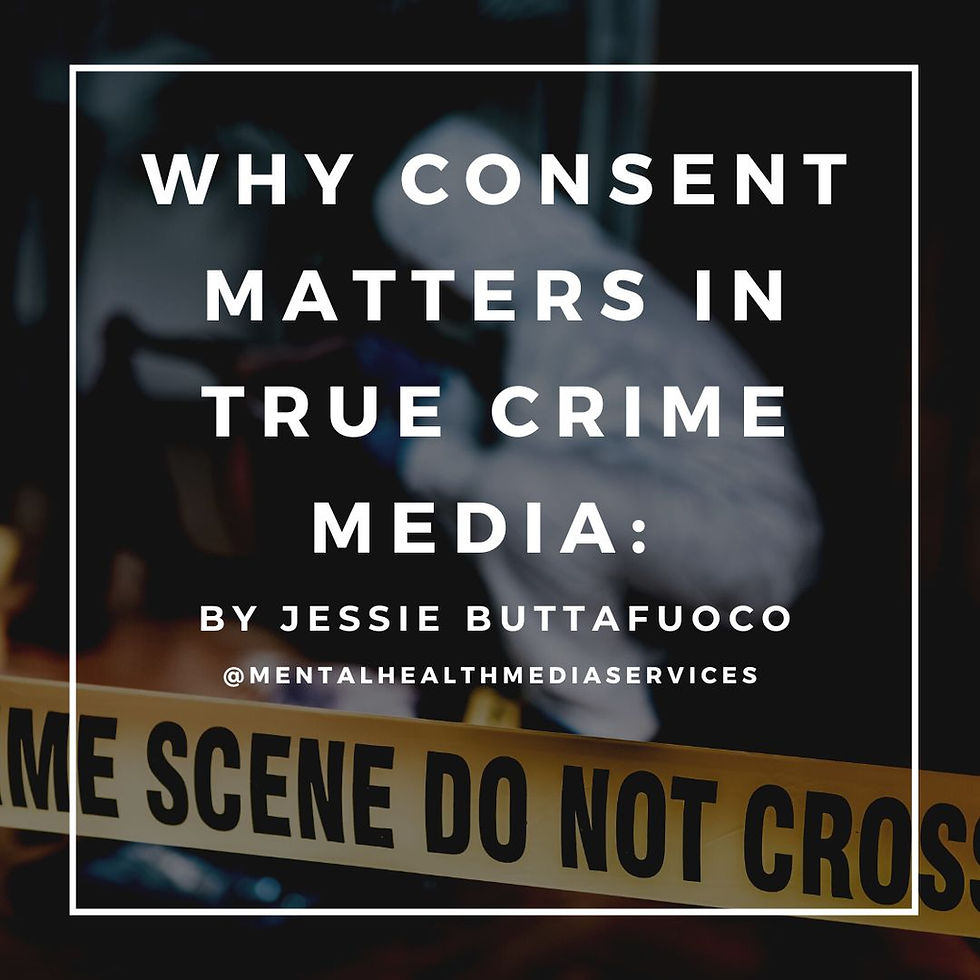The True Cost of True Crime- The Impact of True Crime Media on Victims/Survivors and Their Families.
- jessiebuttafuoco
- May 1, 2025
- 3 min read
Updated: May 1, 2025

True crime has become one of the most consumed forms of media in recent years. From documentaries and podcasts to dramatized TV shows and viral social media threads, audiences seem endlessly fascinated by real-life tragedies. The True Crime Consumer Report reveals that 84% of the U.S. population age 13+ are True Crime consumers, meaning they watch or listen to True Crime through any medium. That’s an estimated 233 million Americans that watch, listen to, or read True Crime content on television, YouTube, social media, podcasts, books, or radio.
During Mental Health Awareness Month, it’s important to remember that behind every headline, every chilling reenactment, and every sensational and nail-biting podcast episode is a human being, like me, Jessie Buttafuoco, who’s trying to put the pieces of their shattered life back together. What often gets lost in the glamorized packaging of True Crime is the profound, lasting impact it has on victims and their loved ones, especially when their trauma is publicized, sensationalized, or fictionalized with or without their consent.
Mental Health Consequences Beyond the Crime
Surviving a violent crime or losing a loved one to violence is one of the most traumatic experiences a person can endure. When that experience is then turned into True Crime entertainment, the trauma is only magnified for victims/survivors of crime and their families. Having to relive the event through news reports, documentaries, or true crime series can re-traumatize victims and families, making healing an uphill battle. It’s not uncommon for survivors to report panic attacks, insomnia, social withdrawal, substance use, anxiety, depression, suicidal ideation and an increased sense of vulnerability after their story is made public.
What is unfortunate about the true crime craze is that mental health is rarely considered when producers, content creators, and/or journalists craft their stories. Often, the focus is on the criminal, the investigation, or the plot twists while the people most impacted are reduced to characterized versions of themselves in someone else’s narrative.
Losing Agency Over Your Own Story
One of the most damaging aspects of being made the subject of true crime media is the loss of agency through narrative hijacking. When someone’s trauma is fictionalized or sensationalized, it strips them of control over their own narrative. The details of their life, the complexities of their relationships, and the nuances of their trauma get flattened into whatever version makes for the best and most profitable story. This sense of helplessness can be profoundly disorienting and impact identity formation because survivors may feel like they’re no longer seen as a person, but as a fictionalized character of themselves. For families of victims, watching the memory of their loved one become distorted for entertainment purposes can be both devastating and infuriating. So just to sum it up, when someone’s sense of agency is stolen, it can cause psychological harm, impact identity formation, and impact social roles.
Navigating Social Roles After Public Victimization
Becoming a public subject of true crime media changes how people see you and how you see yourself. Survivors and victims’ families often report difficulty navigating social roles after their story has been shared with the world. Some experience social isolation as friends and acquaintances struggle to know what to say or avoid them entirely. Others become reluctant public figures, fielding invasive questions, unsolicited advice, and criticism from strangers on the internet. In other cases, individuals feel trapped in a permanent victim identity, unable to move forward because their trauma is continually recycled in the public eye. Healing requires space, privacy, and agency, all of which are often compromised once a story enters the True Crime entertainment complex.
What Needs to Change
The true cost of true crime media isn’t measured by ratings or downloads… it’s measured in the unseen suffering of the people whose lives it commodifies. It is essential we start incorporating Mental Health coordinators into reality based programming, especially True Crime. Media creators have a responsibility to center victims’ voices, seek informed consent, and provide trauma-informed care when telling these stories.
Audiences, too, can be part of the change by consuming true crime ethically: ask yourself whose story is being told, who benefits from its telling, and what impact it might have on the real people involved. Make your choice to consume an informed choice.
At the end of the day, behind every true crime story is a human being trying to heal ... and they deserve better.



Comments